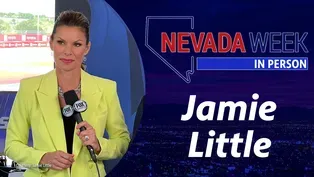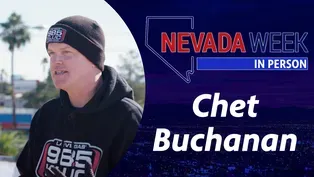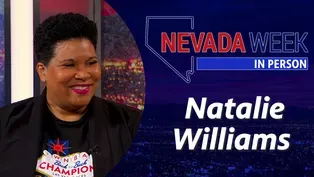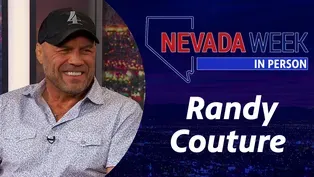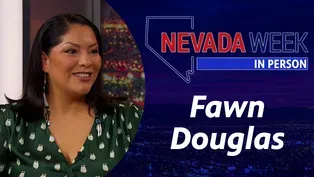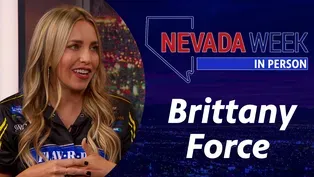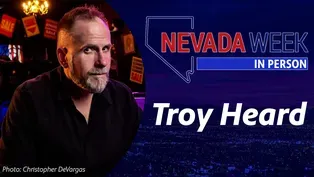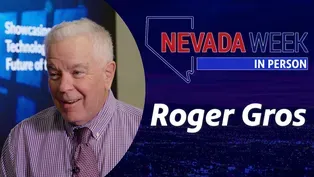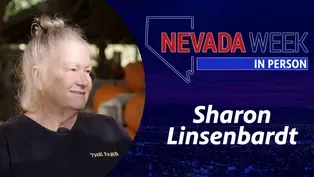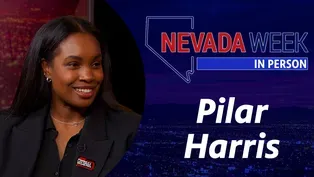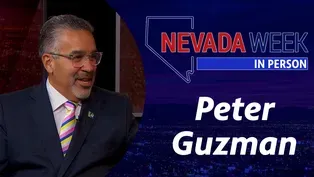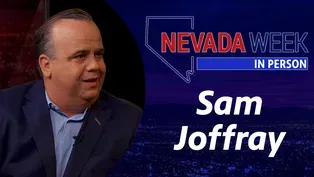
Nevada Week In Person | Mitch Fox
Season 1 Episode 81 | 14mVideo has Closed Captions
One-on-one interview with Mitch Fox, President & CEO of Nevada Broadcasters Association
One-on-one interview with Mitch Fox, President & CEO of Nevada Broadcasters Association
Problems with Closed Captions? Closed Captioning Feedback
Problems with Closed Captions? Closed Captioning Feedback
Nevada Week In Person is a local public television program presented by Vegas PBS

Nevada Week In Person | Mitch Fox
Season 1 Episode 81 | 14mVideo has Closed Captions
One-on-one interview with Mitch Fox, President & CEO of Nevada Broadcasters Association
Problems with Closed Captions? Closed Captioning Feedback
How to Watch Nevada Week In Person
Nevada Week In Person is available to stream on pbs.org and the free PBS App, available on iPhone, Apple TV, Android TV, Android smartphones, Amazon Fire TV, Amazon Fire Tablet, Roku, Samsung Smart TV, and Vizio.
Providing Support for PBS.org
Learn Moreabout PBS online sponsorshipMore from This Collection
Nevada Week In Person | Jamie Little
Video has Closed Captions
One-on-one interview with Jamie Little, NASCAR Broadcaster (14m)
Nevada Week In Person | Chet Buchanan
Video has Closed Captions
One-on-one interview with Chet Buchanan,Host & Creator, 98.5 KLUC’s The Chet Buchanan Show (14m)
Nevada Week In Person | Natalie Williams
Video has Closed Captions
One-on-one interview with Natalie Williams, General Manager, Las Vegas Aces (14m)
Nevada Week In Person | Randy Couture
Video has Closed Captions
One-on-one interview with Randy Couture, UFC Hall of Famer & U.S. Army Veteran (14m)
Nevada Week In Person | Fawn Douglas
Video has Closed Captions
One-on-one interview with Fawn Douglas, Artist and Activist, Nuwu Art (14m)
Nevada Week In Person | Brittany Force
Video has Closed Captions
One-on-one interview with Brittany Force, World Champion Drag Racer (14m)
Nevada Week In Person | Troy Heard
Video has Closed Captions
One-on-one interview with Troy Heard, Artistic Director, Majestic Repertory Theatre (14m)
Nevada Week In Person | Roger Gros
Video has Closed Captions
One-on-one interview with Roger Gros, Publisher, Global Gaming Business Magazine (14m)
Video has Closed Captions
One-on-one interview with Sharon Linsenbardt, Owner, Las Vegas Farm and Barn Buddies Rescu (14m)
Nevada Week In Person | Pilar Harris
Video has Closed Captions
One-on-one interview with Pilar Harris (14m)
Nevada Week In Person | Peter Guzman
Video has Closed Captions
One-on-one interview with Latin Chamber of Commerce Nevada President & CEO Peter Guzman (14m)
Nevada Week In Person | Sam Joffray
Video has Closed Captions
One-on-one interview with Sam Joffray, President & CEO, Las Vegas Super Bowl LVII Host Com (14m)
Providing Support for PBS.org
Learn Moreabout PBS online sponsorshipHead of the Nevada Broadcasters Association and longtime host of Nevada Week in Review, Mitch Fox is our guest this week on Nevada Week In Person.
♪♪♪ Support for Nevada Week In Person is provided by Senator William H. Hernstadt.
Welcome to Nevada Week In Person.
I'm Amber Renee Dixon.
During his more than 30 years at Vegas PBS, he hosted one of Southern Nevada's most watched public affairs shows, Nevada Week in Review.
Now a protector of free over-the-air radio and TV in the state, President and CEO of the Nevada Broadcasters Association, Mitch Fox, thank you for joining Nevada Week In Person.
(Mitch Fox) Amber, thanks for having me.
I'm thrilled to be here.
-It's an honor to have you here.
I wonder, first off, what's it like to be back in this studio?
-Well, you know, this facility is amazing.
You know, Tom Axtell, the former General Manager, helped design this.
I was a part of the planning process, actually.
So my memory, I had a little shot of adrenaline going, walking in here.
But mainly it's the people that work at Vegas PBS.
You know, some of the same staff members have been here for years and years and years.
It was great to see them.
And that's really why the quality local content comes through the station.
It's the staff.
-You had told me, off camera prior to this, that when you began in 1978, you were working out of a high school?
-Yes.
There was no building for this station.
Former Governor Kenny Guinn was Superintendent of Schools at the time, and he claims he was the "Father of Channel 10" at the time, Vegas PBS.
He reminded me of that.
He said, Fox, if it wasn't for you, you-- "If it wasn't for me, you wouldn't have a job.
Just remember that."
So whenever he'd see me, he'd remind me of that.
But we didn't have a building.
We just had a license, and it was at Vo-Tech.
And then, I believe it was in '79, we had a building for us constructed on Channel 10 Drive.
I think you told me, Amber, that a lot of people get confused-- -Still go there.
- --end up on Channel 10 Drive, 4210 Channel 10 Drive.
And then this beautiful facility now, which is really kind of the crown jewel in the Public Broadcasting System, honestly.
-And the building right now is abuzz because you are here.
So many people have missed you, and so many viewers miss you.
I hear about it all the time.
-Thank you.
-"Where is Mitch Fox?"
I wonder do you miss it?
Do you miss hosting Nevada Week in Review?
-From time to time I do, and I'll tell you why.
It was a guest-driven show.
I was kind of a ringmaster, and I would facilitate conversation.
We had the best of the best from Jon Ralston, Steve Sebelius, John L. Smith, Jane Ann Morrison, Jeff German a few times, Howard Stutz, John Huck-- I'm gonna leave off someone-- Rikki Cheese.
And they came in, and they discussed the news that they had been covering all week and then provide a little bit more analysis to it.
So, you know, the model that you've continued is beyond the headlines, behind the headlines.
And we would do that.
The trick was to get those reporters to offer up opinions, and oftentimes they would do.
And when they did, you know, they crossed into that line where they're not supposed to go.
Then it would get colorful and exciting.
And, you know, I heard from the city and county governments.
They would record the show.
And on Mondays, they'd all analyze it.
And then they'd talk about how unfair the media was or, boy, we really did screw up on that story last week.
So it was a fun time.
-How hard was it to get these reporters to give their opinion?
-It was difficult at times.
You know, Jane Ann Morrison, she was such a great reporter.
She felt probably one of-- kind of uncomfortable doing that.
But then you have someone like Jon Ralston, Steve Sebelius.
They didn't have any uncomfortableness at all about offering up their opinion, and because these folks were so dialed in.
They had so many sources.
They were so knowledgeable.
I mean, Jon Ralston to this day-- you had him on a show.
I loved the interview that you did with him.
He has created this marvelous online publication really, The Nevada Independent, to sort of capitalize on his contacts, his relationships, his knowledge.
But he's, he's the political reporter.
And you know, he still appears on MSNBC.
-Yeah.
And his reporters we feature here on our show.
Our format has changed a little bit.
So we're celebrating five years of Nevada Week.
We just entered our sixth season.
But prior it was Nevada Week in Review.
And that was the centerpiece, was journalists on a week-to-week basis, going in depth on their stories.
And you just answered my question of why you think it was so successful: because it was person driven.
-It was.
And the guests brought it every night, and they knew people were watching.
And quite honestly, they would say, John Huck, even to this day, would say, More people recognize me from my appearance on Nevada Week in Review than my own appearances on my station.
I don't know if he'd say that today, but a lot of folks would acknowledge that.
It was, you know, it wasn't like we were getting sky-high ratings, but the people that mattered, the community leaders, the elected officials, the people in business and gaming, they would watch it regularly.
It was gratifying.
It was gratifying to be a part of that for as long as I was.
-Well known for Nevada Week in Review and also for the many debates that you moderated, perhaps the most high profile being that between the late U.S.
Senator Harry Reid and Sharron Angle.
What do you remember about that debate, and why was it so important at the time?
-Well, as-- interesting story to that: Bob Fisher, my predecessor's predecessor at the Nevada Broadcasters Association, he was president and CEO at the time.
He wanted to do this debate, and he started negotiating this debate.
Brought us along, Vegas PBS and myself as moderator.
He thought that, you know, maybe Mitch would be that sort of neutral Switzerland that wouldn't offend too many people and he can get both sides to agree to go ahead and agree to debate.
It was Senator Harry Reid's probably-- it was his last election.
It was the only debate that he did that season.
He was very reluctant to appear.
His opponent was Sharron Angle.
And you probably remember the famous line, "Man up, Harry Reid."
And because he was Majority Leader, we had the New York Times, USA Today, the Today Show , CBS Evening News , I mean NBC, Wall Street Journal.
My mother held up the front page of USA Today with me on it to her girlfriends.
And finally she said, See my son.
I had been in the business for like 20 years, but she thought that was a big deal.
I mean, the media hordes that converged here at Vegas PBS, it was an incredible experience.
Almost didn't happen.
People don't know the backstory to that.
There were so much negotiation going on behind the scenes.
We were really wondering if the candidates would show up, and, sure enough, they did.
And it made a lot of news.
-Any of those negotiations you can disclose?
-Not a bit.
[laughter] -Because you probably signed something that said you would never.
-Well, no.
I think just from an ethical standpoint it's best to kind of leave that aside.
I will tell you they were kind of interested in the format.
You have to negotiate so much.
You know, Amber, when it comes to a debate, opening and closing messages: Are they standing?
Are they sitting?
Who are they going to be standing next to?
Is there going to be makeup?
What's the lighting like?
They want to come to the studio to survey the whole, the premises.
When Senator Reid was here during that particular debate, we had Secret Service case the joint from top to bottom to make sure there were no weapons here or anything like that.
So it was quite an experience.
-I mean, these are people that are elected to represent a mass amount of people.
And for them to care so much about these minute details, do you get it?
Did it bother you?
-No.
Well, at times it did.
There was one debate that I negotiated a while ago in our old building, where we had the campaign managers of each campaign.
It was a gubernatorial debate, but that's as far as I'll say.
And I got them in a room, a very small room, and we started negotiating back and forth.
And they started yelling and screaming at each other, yelling profanities.
And I said, You know what, gentlemen?
Just have at it.
I'm leaving.
And they went at it.
The door closed, and I could hear them yelling and screaming.
And I thought, you know what?
It's not that important.
But we finally did get that debate.
And it was a big, big deal to get that gubernatorial debate, so I was pleased about it.
But what goes on behind the scenes with these debate negotiations...
I hear the other side too.
Why negotiate?
Just issue an invitation.
People have told me that.
"Why do you negotiate?
You shouldn't cave into their demands."
Just go ahead, hold the debate.
If they show, they show; if they don't, they don't.
My standpoint, and really the former general manager here, Tom Axtell, was if a candidate doesn't show or if both candidates don't show, you don't have a program.
Are you going to put a sign with their photograph on the sign and they didn't show?
That doesn't help the viewers at all.
So we tried to get 100% participation, and we got it.
-The state of debates right now.
There were so few the last election cycle, not just in Nevada, but across the country.
Why do you think that is?
-I think to a certain extent political consultants are telling their candidates it's not worth it: It's not worth the preparation.
It's not worth the time.
The ROI is not there.
Perhaps the ratings, they're not there as well.
I would tell you, when we did this, and I was thinking about why.
We did Assembly debates and Senate debates and County Commission debates, and we did-- -District Court judge debates.
-District Court judge debate.
The only station probably to this day that's ever done that.
Why did we get so much participation particularly in the high-profile debates like U.S. Senate, which to this day C-SPAN actually has a section of their website-- -Dedicated to you.
-Well, dedicated to the debates we did here at the station, but thank you.
So I think, well, how did that all come together?
And I was thinking about that, Amber, and it's this: I knew that this station in and of itself didn't have enough leverage to do these debates.
So what we did was we went to all the radio stations, all the other TV stations, we went to the RJ, the RGJ, Reno Gazette-Journal in Reno.
We even collaborated with UNLV, and we said, let's do a debate together.
Because if I go to this U.S. Senate candidate and say, Well, it's a Channel 10 debate, they may or may not participate.
If I tell them it includes Review-Journal, it will be in the Continuing Education Catalog at UNLV.
It's going to be seen in Reno and Elko, it's going to be heard on radio, on public radio stations and commercial radio stations, they go, oh, I could do just that one and I don't have to do any others.
And that's really the reason that we have the high-profile debates.
-When you watch debates now, what do you think?
And is it something you would still want to be part of?
-No.
-Why not?
-No.
You know, it's kind of interesting.
We've got some Presidential debates coming up, and I think that the viewer is best served through debates.
But unfortunately, because there aren't enough of them, viewers, voters are getting their information from Facebook and Google and online.
And I'm sorry.
I mean, I'll be quite blunt.
You will not find a lot of objective information online about candidates on the social media sites.
You're just not.
And there's a lot of conspiracy theories out there and a lot of lies.
And so one thing I really admire about you, we were just-- I'm gonna butter you up a little bit because you deserve it.
You went to a great J-School in Arizona, you have a journalism background, you're a great interviewer, and that's what's the essence of local news, of local stations.
There are several Amber's out there in our market.
And that's why I loved representing them is because they've done their homework, they've done their preparation.
You know, they don't send out softballs.
But on the other hand, they're not out to make someone look bad purposely.
They want the truth.
And so I respect what you do.
I respect what you've done here at the station.
And what Mare Mazur has done as general manager here, it's taken the station to a whole nother level.
But I think that's why I love what I do, is I get to represent people like you.
-Oh, boy, now you got me all flustered.
[laughter] -In your current role with the Nevada Broadcasters Association, you mentioned a couple of issues that you're seeing within local journalism-- well, journalism across the country.
What are other threats that local TV and local radio stations are facing?
-Yeah.
So I think for one thing, let's talk about on the journalism side, right?
I think sometimes I have to be careful, my stations have to be careful-- my station has to be careful-- of not being painted with the same brush as the screamfest on cable news.
You can go on.
I could name the cable stations right now.
Because I don't want to offend anyone, so I want to make sure that I say most cable stations are that way.
It's very inflammatory.
They're talking over each other.
-Why do you think that started?
-Well, it started a while ago, right?
But I think why cable news has become so influential, it's not because cable ratings have gone up.
It's because of the replays on YouTube and social media.
That's why it's getting as much attention.
It's that soundbite.
It's that clip that you, that you see on that social media site that gets played over and over again.
So I'm concerned because I know.
And I'm sorry, the local news media are not the enemy of the people.
And I know new stations that had to cover up the logos on their vans because they were being vandalized by people that thought they were the enemy of the people.
Now, regardless how-- I don't think, in general, the news media is the enemy of the people, honestly.
But I know the local media is not the enemy of the people.
And so then hopefully that tide has turned.
-And that is why the Nevada Broadcasters Association exists.
Thank you for protecting local television and radio.
And, Mitch Fox, thank you for taking the time for Nevada Week In Person.
For more interviews like this, please go to vegaspbs.org/nevadaweek.
♪♪♪
Support for PBS provided by:
Nevada Week In Person is a local public television program presented by Vegas PBS
